Fresno State is so good that even their assistant coaches have NCAA tourney and NIT wins on their resume! Assistant coach Jerry Wainwright made the postseason 7 times in a 10-year stretch as head coach of UNC-Wilmington/Richmond/DePaul, and now he works for Fresno State head coach Rodney Terry. Earlier today the Bulldogs pulled off 1 of the biggest upsets of the week thanks to a 5-PT win over San Diego State in the Mountain West tourney title game to earn an automatic bid to next week’s NCAA tournament. HoopsHD’s Jon Teitel got to speak with Coach Wainwright about recruiting Tim Duncan to Wake Forest and coaching Stephen Curry on team USA.
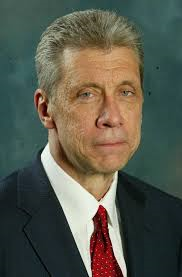
After being named Colorado District COY in 1975, you returned to your home state as an assistant coach at East Leyden High School in suburban Chicago where your teams went 104-4 over a 4-year span: what made you such a great high school coach, and how was your team able to be so dominant? I worked for a high school HOF coach named Norm Goodman, who was way before his time in terms of player development. We had several high school Americans and a bunch of big kids including Glen Grunwald (who used to work as senior VP of basketball operations for the Knicks). It was a working class neighborhood but our school had a great athletic program. We won several state titles in football and wrestling: 1 of the kids who played QB was Mike Shanahan! Norm was the ultimate mentor: I got to meet every college coach in the country at the 5-star basketball camp prior to the AAU circuit, and we had a bunch of Hall of Famers who played at the camp (Michael Jordan, Patrick Ewing, etc.). We also had a lot of great coaches: Rick Pitino, John Calipari, etc. I do not think I was anything special: I just had great on-the-job training.
You were an assistant coach to Dave Odom at Wake Forest where you helped recruit Tim Duncan: how did you convince Duncan to attend Wake Forest, and where does he rank among the best players you have ever coached? I was at Xavier for 1 year under Bob Staak and then I moved with him when he took the job at Wake Forest. Every team in the ACC had a great coach back then: Jim Valvano at NC State, Dean Smith at UNC, etc. Bob was let go after a few years but Dave retained me after he took over. The ACC was really at its heyday back then with the original 8 teams. Tim is certainly in a tie for #1 in terms of the best combination of person/player: he was untainted by the American basketball system. He had an incredible work ethic and never had a bad practice.
What are your memories of the 2000 NCAA tourney (you lost to #2-seed Cincinnati who was playing without injured All-American Kenyon Martin)? They might have been the #1 team in the country before Kenyon got hurt. It was the 1st tourney game in our school’s history. We were waiting for our charter flight in Wilmington, NC…but they had accidentally sent the plane to Wilmington, DE! I think we were so excited to be there that we were similar to tourists: we were almost too hyped/prepared and did not play our best game.
What are your memories of the 2002 NCAA tourney in Sacramento (Brett Blizzard had 18 PTS and made 2 FTs with 3 seconds left to clinch a 4-PT OT win over USC for the school’s 1st-ever tourney win, but Jared Jeffries had 20 2nd-half PTS in a 9-PT win by eventual national runner-up Indiana)? I had no idea how much the northern California fans disliked teams from southern California. We were up by 17 PTS with 7 minutes to go against USC but almost let it get away. Brett left his man (Errick Craven) to help at the end of regulation and Craven made a 3-PT shot to tie the game. The air was just sucked out of the arena and we were totally deflated: it was a long walk back to the bench for our guys on the court. I looked each of my players in the eye and told them that we had a 5-minute game ahead of us for the right to make the field of 32. Brett looked like a deer in the headlights but I told him to stop apologizing and just sit down and listen. We played terrific in OT: it probably had more meaning for us because the kids did a great job when the going got tough. We might have had the longest distance to get to our game of any team in the tourney. We went right to the wire against Indiana but had a bad 4-minute stretch where we could not buy a basket.
After the tourney you left UNC-Wilmington to become head coach at Richmond: why did you decide to make the move, and did you have any regrets? I enjoyed Wilmington and lived right outside the downtown area for many years. The definition of a successful coach at my age is a guy who is still coaching! I had a great assistant in Brad Brownell (now the coach at Clemson) and most of the team was coming back so I was able to leave the program in good shape. You have such a short window as a coach: I just thought it was the right time to try coaching in a conference like the A-10. I look at UNC-Wilmington like my family so I knew that they would be okay on their own. If I did not leave at that point I do not think that I ever would have left. It was by far the most difficult decision I have ever made. I have no regrets and no hard feelings because I learned a lot of lessons at Richmond.
What are your memories of the 2004 NCAA tourney (despite having a double-digit lead in the 2nd half and a scoreless Devin Harris in foul trouble you ended up losing to Wisconsin in Milwaukee)? The Badgers were a #5-seed despite winning the Big 10 tourney. Thanks to the pod system we got to play them in Milwaukee, but as both of us have red as a school color I tried to convince my guys that everyone wearing red in the stands was rooting for us! We had a 3-on-1 break when Reggie Brown blew out his knee and the game went downhill from there. It was the classic circumstance where we felt like the gladiators being thrown to the lions. We were 1 of the last teams called during Selection Sunday but that was the year that the A-10 had a whole bunch of teams make it.
In 2005 you returned to your hometown of Chicago to become head coach at DePaul: was it extra-special to go back home, and what was the biggest difference between your previous mid-major jobs and the DePaul job? That was the 1st year that DePaul joined the Big East and we had 3 guys leave early for the draft, which made it tough to succeed. Everyday I was touched to see someone who I had previously coached or went to school with. My best friend from high school had died in Vietnam and his sister re-connected with me after I moved back there. We graduated everyone and did not have any major problems. There are higher expectations and more pressure at that level.
In the summer of 2007 you led the USA Basketball Under-19 team to the title game of the FIBA World Championships in Serbia before a 5-PT loss to the host country and a silver medal for Team USA: how close did you come to winning the gold, and which player impressed you the most (Michael Beasley, Stephen Curry, other)? That was an unbelievable time. Darrell Arthur broke his leg in training camp so we were not a very big team and not expected to do very much, but we had some incredible guards (Curry, Jonny Flynn, etc.). I know that I made USA Basketball squirm a bit but I told our guys that we were going to be sleeping in bad beds in hot hotel rooms in cities where everyone disliked us! I told them that they would learn more about toughness and facing adversity on the road in front of hostile crowds than they ever did while in college. I also told them not to complain because I was going to buy a plane ticket home for the 1st guy who started moaning about anything: to their credit they did not complain at all. The trip cost me thousands of dollars because I had to pay the cook to make us American-style food. There were fans in the crowd who actually spit on us and booed us when we got our medals.
You were fired from DePaul in January of 2010: were you surprised that they made a coaching change midway through the season? I did not like how it ended but I think it was simply because I did not win enough games. I understand the employer-employee relationship: when I 1st got into coaching someone told me that everyone is just an interim coach. I do wish that I had a chance to make it through the end of the season but young players take some time to adjust to the level of play in the Big East. I will always pull for DePaul because it is my hometown school. In my last game against Villanova I broke my leg when Corey Fisher dived for a loose ball. I ended up on crutches for 11 weeks during the winter in Chicago: that was fun! I was offered jobs in administration and in broadcasting but I have been a coach my whole life.
When people look back on your career, how do you want to be remembered the most? From a professional standpoint I think people would say that I never changed. People think you are wise once you age and your hair turns gray! I enjoyed teaching the game and think that I am recognized as a great practice coach. The game is humbling so I was always interested in getting better. My mantra was “we do not beat ourselves”: we were concerned with doing all the things necessary to put us in a position to win. I have been very blessed and I know almost everyone in the coaching business because I have coached at every level. I am excited about the fact that there are a lot of young coaches out there who want to learn. The business has become so competitive and so cutthroat but it is also a people business because it is your own players who are on the court. You really have to enjoy the moment. I asked Coach K about it back in the day and he told me that he talks to his guys more than he coaches them. My rule was that kids had to come and talk to me in my office every day, which was the best thing I ever did. Back in the day you had to tell everyone to be quiet because they were talking all the time: now you have to tell them to speak up because they all escape into their own world (headphones, cell phones, etc.). A good team player is more interested in the scoreboard than in the scorebook.

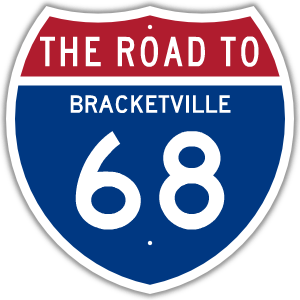
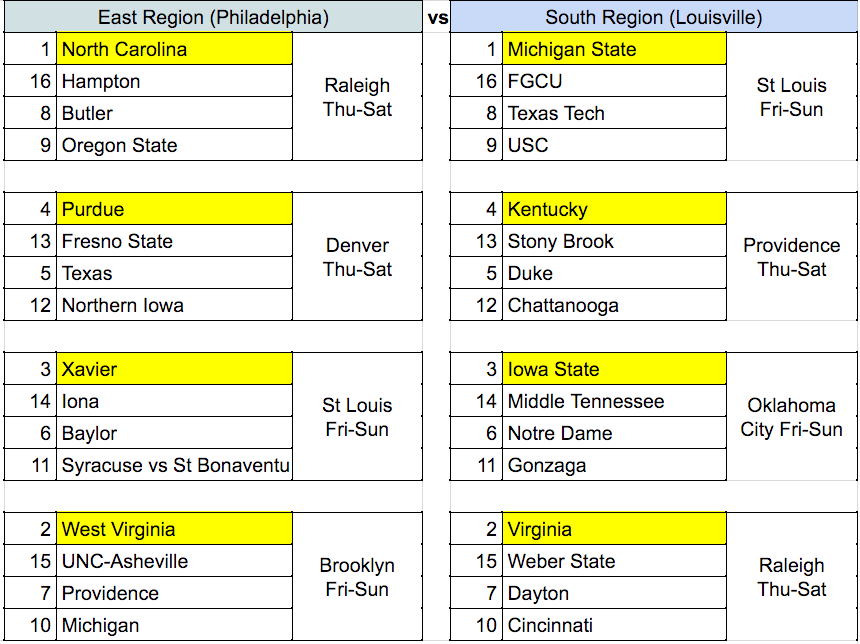
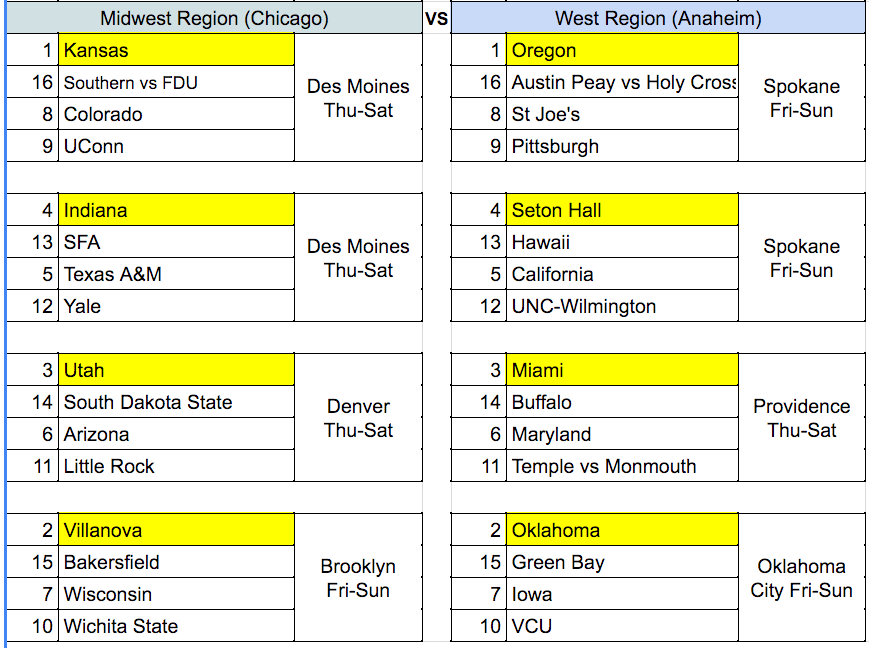
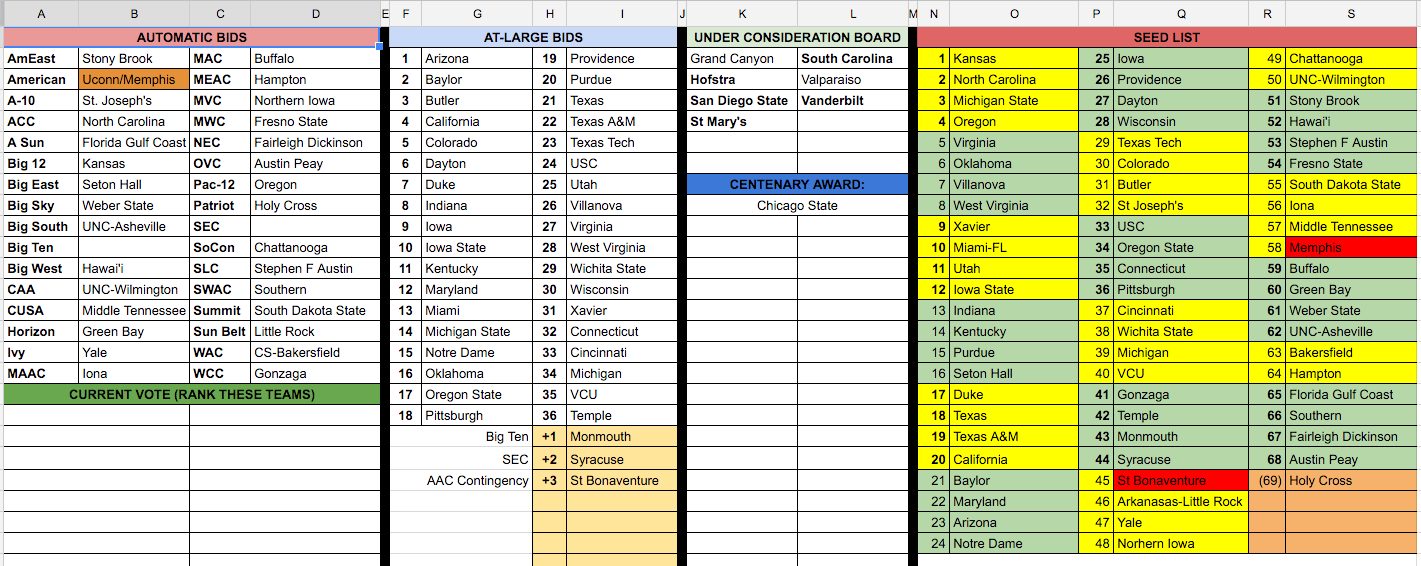




Hoops HD Mock Committee Report – Saturday, March 12
Click here for Jon Teitel’s interview with UNC-Wilmington G Craig Ponder and also click here for his interview with Fresno State (and former UNC-Wilmington/Richmond/DePaul head coach) assistant coach Jerry Wainwright
Finally, click here for Jon’s latest forecast of guessing the Selection Committee’s bracket through Saturday’s games.
We at HoopsHD have finished our 3rd day of deliberations – we began the night by doing a further scrubbing of the Under Consideration board. Besides the honorary selections of Chicago State and Grand Canyon, the only teams that remained were VCU, Temple, Syracuse, Monmouth, St. Bonaventure, South Carolina, San Diego State (following a loss in the Mountain West championship to Fresno State), St. Mary’s, Vanderbilt, Arkansas-Little Rock (assuming they were to lose to Louisiana-Monroe in the Sun Belt championship), Valparaiso and Hofstra. After the first round of debates, we voted on 3 more at-large teams (since we were guaranteed a bid would open up out of the SEC) – VCU, Temple and South Carolina. The VCU inclusion meant that a spot in the Atlantic 10 was guaranteed to open up; this meant that the only contingency pick needed would be in the American conference since the Sun Belt was not deemed worthy to get 2 bids in the event of a UL-Monroe win/Arkansas-Little Rock loss. Monmouth was voted as the last team into the field and St. Bonaventure was voted as a contingency team in the event that UConn wins the American championship against Memphis.
Our next order of business was to complete the rest of the master seed list; teams seeded 33 through 72 were added to the field since the WAC and Big West championship games were in progress. After New Mexico State and Long Beach State were eliminated, we were left with a master seed list of 70 teams that included the contingency picks of St. Bonaventure and Arkansas-Little Rock/Louisiana Monroe. After the seed list was completed, committee member Joby Fortson (author of the HoopsHD Nitty Gritty Rankings – click here to view his rankings) began to strongly debate the merits (or lack thereof) of South Carolina’s inclusion into the field; a motion was also made to reconsider St. Bonaventure and Syracuse as well. Chad Sherwood (our committee chair) had us rank the teams 1 through 3 after more debate took place on the aforementioned teams. As a result of this vote, Syracuse was added to our First Four, St. Bonaventure remained as our contingency team and South Carolina was voted off the seed list. It took 8 votes for this motion to be allowed to take place.
Our third and final major task of the night was to do our initial scrub of the seed list (see the bracket below):
The 1-line was adjusted to include North Carolina and Oregon after they both won their conference championships (and respective doubles with the regular season titles). Villanova and Xavier both moved down a seed line, but the biggest winner tonight was Seton Hall. Not only did their wins over Xavier result in both the Wildcats and Musketeers moving down, it vaulted the Pirates into protected seed territory! Also take note that all of the teams that were Under Consideration were moved to the NIT/other postseason board; only the regular season champions highlighted in red are guaranteed inclusion into the NIT. The other teams listed don’t necessarily have to go to the NIT but could be invited to the CBI, CIT or even the new Vegas 16 that debuts this season. The fact that the teams added up to 32 is purely coincidental; it was not the job of our committee to dictate to the NIT who should be selected since they have a separate process of their own.
More scrubbing of the master seed list will take place in the Sunday meeting to account for championships in the Atlantic 10, Sun Belt, SEC, Big 10 and the American. We will do 2 contingency brackets once the first wave of games go final; this will be due largely to whether UConn wins and St. Bonaventure gets into the field OR if Memphis wins the American and steals the bid from the Bonnies. Be on the lookout for those brackets at about 4:30 to 5 PM before the actual bracket is unveiled following the completion of the Big 10 and American championships.